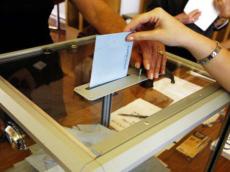|
|
TODAY.AZ / World news
Could Turkey establish a coalition government?
10 June 2015 [10:19] - TODAY.AZ

By Sara Rajabova
Though the parliamentary elections in Turkey have ended with a record turnout of 86 percent, none of the parties received enough votes to form a single-party majority government.
Now main issue on the agenda of political discussions is to form a coalition of political parties to set up the government within 45 days. Otherwise, the country will have to hold early parliamentary elections.
Forming a coalition of parties with absolutely opposition minds indeed seems difficult.
Although the ruling Justice and Development Party (AKP) received majority of the votes - 41 percent in June 7 elections, it failed to fulfill the 276 seats required to form a single-party government and now needs support from other parties to secure a vote of confidence.
The AKP will be represented in the parliament by 258 MPs, while the Republican People's Party (CHP) by 130 MPs. The Nationalist Movement Party (MHP) will have 82 seats in the parliament.
The key milestone of the elections was the opposition Peoples’ Democratic Party’s (HDP) passing the election barrier by receiving over 13 percent of the votes. This party will send more than 70 members to parliament.
Since none of the parties want to form a coalition with the AKP, it is not ruled out that a special election will be held in Turkey.
In meantime, President Recep Tayyip Erdogan said no political party in Turkey will be able to create a government on their own, Anadolu Agency quoted him as saying on June 8.
He called on all parties to assess the results of the June 7 parliamentary election “healthily and realistically,” adding the Turkish people’s choice stands above everything.
Devlet Bahcheli, the leader of the right-wing MHP, said after the elections that Turkey should hold a new election if the ruling AKP is unable to agree on a coalition with parliament's two other opposition parties, Hurriyet reported.
The MHP was seen as the most likely junior coalition partner for the AKP, which lost its simple majority in the elections. But MHP leader ruled that out, saying "other options should be pursued first".
He went on to say that the first possibility for a coalition should be between the AKP and (pro-Kurdish) HDP, adding the second model can include AKP, CHP and HDP.
Bahcheli said holding early elections will become a must if all these scenarios fail.
The European Union has welcomed the high turnout in parliamentary elections, and expressed readiness to make progress in relations between Brussels and Ankara.
“Turkey’s general election on June 7 took place with a record 86 percent turnout, showing a clear sign of strength in the Turkish democracy,” said EU High Representative/Vice-President Federica Mogherini and EU Commissioner Johannes Hahn in a joint statement released on June 8.
Some 20 political parties involved in the elections, in which over 53 million people cast their votes.
Although the initial count has been completed, the figures still need to be verified by the Supreme Election Council, which could take up to 12 days. The process is expected to end by June 20.
Once the final results are announced, members of the 25th Grand National Assembly must swear in five days.
URL: http://www.today.az/news/regions/141315.html
 Print version
Print version
Connect with us. Get latest news and updates.
See Also
- 01 August 2025 [21:46]
Indonesia opens 2nd phase of aseptic packaging plant - 01 August 2025 [20:50]
Microsoft accuses FSB hackers of targeting foreign diplomats - 01 August 2025 [20:21]
Pakistan to receive first US crude oil shipment - 01 August 2025 [18:41]
Boxing Federation Officials discuss future strategies - 01 August 2025 [18:21]
MughaMix project presented at Karak Int'l Culture and Arts Festival - 01 August 2025 [09:00]
Brazil halts oil exports to US over new duties - 01 August 2025 [08:00]
Saudi Arabia builds dams to collect rainwater - 31 July 2025 [23:50]
Türkiye advances toward fully domestic air defence network - 31 July 2025 [22:48]
Kamchatka earthquake among largest in modern history - 31 July 2025 [22:23]
EU updates hand luggage liquid rules
Most Popular
 Yerevan accepts the inevitability of the Zangezur corridor
Yerevan accepts the inevitability of the Zangezur corridor
 Are Armenians now in favor of peace with Azerbaijan? It's time for Pashinyan to act
Are Armenians now in favor of peace with Azerbaijan? It's time for Pashinyan to act
 New Israeli ambassador arrives in Baku
New Israeli ambassador arrives in Baku
 Turkish citizen arrested for attempting illegal border crossing into Azerbaijan
Turkish citizen arrested for attempting illegal border crossing into Azerbaijan
 Head of Azerbaijani diaspora in Yekaterinburg placed on Russia’s wanted list amid ongoing investigation
Head of Azerbaijani diaspora in Yekaterinburg placed on Russia’s wanted list amid ongoing investigation
 Garabagh cuisine showcased within Pastry & Bakery Chefs Baku Cup 2025
Garabagh cuisine showcased within Pastry & Bakery Chefs Baku Cup 2025
 US supply China with less advanced Nvidia chips
US supply China with less advanced Nvidia chips
